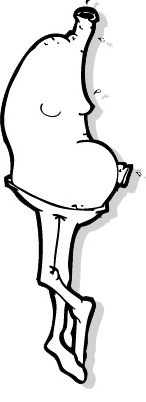What's that smell?
Tuesday, 15 January 2008 by kinakoJam
A series of articles in the NY Times called 'Empty Seas' is documenting the dirty business of fisheries. It seems The Last Appetite's prophecies are nigh, at least in Europe and West Africa.
Until further notice, I'll restrict my aquatic vertebrate consumption to trout from the river near Erik's dad's house. And farmed prawns. Nobody'd miss a little prawn or two, would they......?
This is a very sad business.
Part 2 in the NY Times series 'Empty Seas'
Until further notice, I'll restrict my aquatic vertebrate consumption to trout from the river near Erik's dad's house. And farmed prawns. Nobody'd miss a little prawn or two, would they......?
This is a very sad business.
Fish is now the most traded animal commodity on the planet, with about 100 million tons of wild and farmed fish sold each year. Europe has suddenly become the world’s largest market for fish, worth more than 14 billion euros, or about $22 billion a year. Europe’s appetite has grown as its native fish stocks have shrunk so that Europe now needs to import 60 percent of fish sold in the region, according to the European Union.
In Europe, the imbalance between supply and demand has led to a thriving illegal trade. Some 50 percent of the fish sold in the European Union originates in developing nations, and much of it is laundered like contraband, caught and shipped illegally beyond the limits of government quotas or treaties. The smuggling operation is well financed and sophisticated, carried out by large-scale mechanized fishing fleets able to sweep up more fish than ever, chasing threatened stocks from ocean to ocean.
The Canaries, a Spanish archipelago off the coast of Morocco, have become the favored landing point of illegal fish as well as people.
Once cleared there, the catch has entered the European Union and can be sold anywhere within it without further inspection. By the time West African fish get to Europe, the legal fish are offered for sale alongside the ill gotten.
The European Commission estimates that more than 1.1 billion euros in illegal seafood, or $1.6 billion worth, enters Europe each year. The World Wide Fund for Nature contends that up to half the fish sold in Europe are illegally caught or imported. While some of the so-called “pirate fishing” is carried out by non-Western vessels far afield, European ships are also guilty, some of them operating close to home. An estimated 40 percent of cod caught in the Baltic Sea are illegal, said Mireille Thom, a spokeswoman for Joe Borg, the European Union’s commissioner of fisheries and maritime affairs.
Part 2 in the NY Times series 'Empty Seas'

I'm hardly the first one to make the call about fish running out - people have been predicting that "peak fish" happened about twenty years ago.
There's a researcher named Daniel Pauly who has pretty much devoted his life to it. Here is one of his articles where he measures that global fish catches peaked around 1987.
Sure. And plenty of issues around farmed fish too.
The outlook for fish is generally grim.
But it's always discouraging to catch the developed world yet again trying to plunder and/or turn a blind eye to 3rd party plundering of seas outside their jurisdiction.
Europe, I thought you were better than this!!